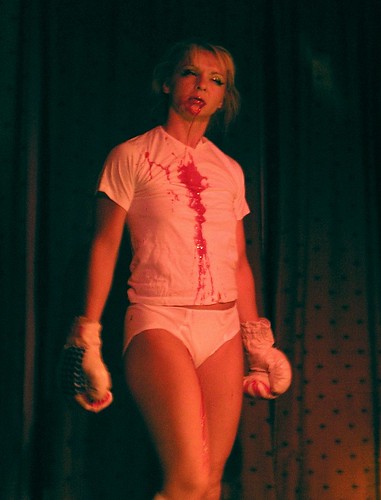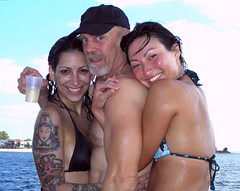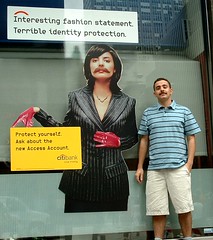 A couple of years ago i read Bill Mckibben’s book Enough. It’s a great read. In the book he discusses what it means to be human. There are 3 subjects he focuses on in the book: genetic research, nanotechnology and robotics. In each one he explores that ever shrinking moral and spiritual boundary. Eventually, we’ll get to an “enough point” where we should stop trying to push the limits of technology and medicine.
A couple of years ago i read Bill Mckibben’s book Enough. It’s a great read. In the book he discusses what it means to be human. There are 3 subjects he focuses on in the book: genetic research, nanotechnology and robotics. In each one he explores that ever shrinking moral and spiritual boundary. Eventually, we’ll get to an “enough point” where we should stop trying to push the limits of technology and medicine.
My favorite part is the discussion of genetically enhanced children and how science (and our ambition) continues to push the limits of what is possible and how children, in enhacned, will never be strive to be great or to achieve as pianists, painters, or athletes because of their “programming.”
I always like Mckibben’s summary of the state of affairs and the recognization of trends in society both on a cultural and technological level – and he does a great job here. Here, more than his others he looks at the family structure and how it has been altered due to television and he doesn’t paint a good picture…
So, in the last century, the invention of the car offered the freedom of mobility, at the cost of giving up the small, coherent physical universes most people had inhabited. The invention of radio and TV allowed the unlimited choices of a national or global culture, but undermined the local life that had long persisted; the old people in my small rural town can still recall when “visiting” was the evening pastime, and how swiftly it disappeared in the 1950’s when CBS and NBC arrived. The 60’s seemed to mark the final rounds of this endless liberation; the invention of divorce as a mass phenomenon made clear that family no longer carried the meaning we’d long assumed, that it could be discarded as the village has been discarded; the pill and the sexual revolution freed us from the formerly inherent burdens of sex, but also often reduced it to the merely “casual.”
…how all this has happened and what it means to us…
Whether all this was “good” or “bad” is an impossible question, and a pointless one. These changes came upon us like the weather; “we” “chose” them only in the broadest sense of the words. You may keep the TV in the closet, but you still live in a TV society. The possibility of divorce now hovers over every marriage, leaving it subtly different from what it would have been before. What’s important is that all these changes went in the same direction: they traded context for individual freedom. Maybe it’s been a worthwhile bargain; without it, we wouldn’t have the prosperity that marks life in the West, and all the things that prosperity implies. Longer life span, for instance; endless choice. But the costs have clearly been real, too: we’ve tried hard to fill the hole left when community disappeared, with “traditional values” and evangelical churches, with back-to-the-land communes and New Age rituals. but those frantic stirrings serve mostly to highlight our radical loneliness.
All of this makes me hate myself for loving the show Seinfeld, which is actually just a show exploring what it means to live a life that has no meaning. It is true, when i look around I see a world where there’s nothing but consumption – and when Mckibben points it out, I had to step back and let out a big whoa.
Where it all ends – the mindless consumption, the lack of context – is that we need to take a stand as individuals and produce context for ourselves. If genetic engineering takes place, the human race can lose the ability to be an individual and for each person to have meaning. If technology continues, we can continue to go beyond nature to a world that is completely unrecognizable. McKibben concludes that it is our capacity as humans for restraint-and even for finding great meaning in restraint. “We need to do an unlikely thing: We need to survey the world we now inhabit and proclaim it good. Good enough.”
As a lover of technology and change, the concept of “Good enough” is quite a thought. You should definitely read this book.


 One of my favorite authors, Kurt Vonnegut, died this past week at the age of 84. He led a pretty incredible life. Born in 1922 in Indiana, he began his writing career at his high school newspaper, The Daily Echo. He briefly attended Butler U, but dropped out when a professor said his stories were not good enough. He then went to Cornell (41-42) where he served as an editor for the student newspaper and majored in biochemistry. He enrolled at Carnegie Mellon in 1943 but studied there only briefly before enlisting in the Army (it was WWII).
One of my favorite authors, Kurt Vonnegut, died this past week at the age of 84. He led a pretty incredible life. Born in 1922 in Indiana, he began his writing career at his high school newspaper, The Daily Echo. He briefly attended Butler U, but dropped out when a professor said his stories were not good enough. He then went to Cornell (41-42) where he served as an editor for the student newspaper and majored in biochemistry. He enrolled at Carnegie Mellon in 1943 but studied there only briefly before enlisting in the Army (it was WWII). I just finished reading the book The Unbearable Lightness of Being by Milan Kundera. Man, that’s a great book. It’s philosophical and real at the same time. All four characters in the book as so disillusioned, their stories are totally captivating Some of my favorite passages are below.
I just finished reading the book The Unbearable Lightness of Being by Milan Kundera. Man, that’s a great book. It’s philosophical and real at the same time. All four characters in the book as so disillusioned, their stories are totally captivating Some of my favorite passages are below. Kierkegaard, the Danish philosopher fell in love with an attractive girl, Regine Olsen, and then he had concluded that they would be incompatible, that the love was mistaken, that he himself was so complex and she was simple, and he contrived to break the engagement so as to give the appearance that it was the young lady’s fault, not his.
Kierkegaard, the Danish philosopher fell in love with an attractive girl, Regine Olsen, and then he had concluded that they would be incompatible, that the love was mistaken, that he himself was so complex and she was simple, and he contrived to break the engagement so as to give the appearance that it was the young lady’s fault, not his. be mated to somebody, that solitude is a mistake. The inner voice doesn’t care about who you find. It just keeps pestering you, tormenting you – if you happen to be me – with homecoming queens first, then girls next door, and finally anybody who might be pleased to see you now and then at the dinner table and in bed on occasion. You look up from reading the newspaper and realize that no one loves you, and no one burns for you. The workings of nature are mysterious, but they do account for a certain amount of despair among single persons, the irrelevance you sometimes feel.
be mated to somebody, that solitude is a mistake. The inner voice doesn’t care about who you find. It just keeps pestering you, tormenting you – if you happen to be me – with homecoming queens first, then girls next door, and finally anybody who might be pleased to see you now and then at the dinner table and in bed on occasion. You look up from reading the newspaper and realize that no one loves you, and no one burns for you. The workings of nature are mysterious, but they do account for a certain amount of despair among single persons, the irrelevance you sometimes feel. I’m trying to make a point to blog about books i’ve read, so here goes….
I’m trying to make a point to blog about books i’ve read, so here goes….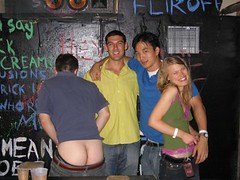 First, it was really interesting to see what college life was like in the early 1960’s because of the emergence of rock n’ roll and the absence and importing of women at/to the school. Chris was really into rock and roll, which was new on the scene. Rock and roll at the time was played exclusively by African Americans and was not universally listened to. When rushing a frat, he remarked that most of the frats didn’t even know about Rock at all. AD back then fully embraced it and most of his stories either revolved around the music or at least discussed what what music was playing. The management of women at colleges in the 60’s is amazing. Women would train up to dartmouth for a weekend and be paired with a date for the entire time which would transform the entire campus. For the guys, it was like going on a 2-3 day blind date. As someone who’s been on a bunch of blind dates, i can see how this would be painful (both for the men and the women) and could lead to some social madness. I can also see why there was so much alcohol involved. Further discussion with my parents about this time has shown that travelling to schools and finding the right guy/girl was one of the main mechanisms provided at the time to find a suitable husband. Keep in mind that no sex before marriage was believed to be normal and there weren’t many options for birth control. After reading this, i’m very happy that i came through 40 years later when women were on campus and many of the dating conventions have been changed.
First, it was really interesting to see what college life was like in the early 1960’s because of the emergence of rock n’ roll and the absence and importing of women at/to the school. Chris was really into rock and roll, which was new on the scene. Rock and roll at the time was played exclusively by African Americans and was not universally listened to. When rushing a frat, he remarked that most of the frats didn’t even know about Rock at all. AD back then fully embraced it and most of his stories either revolved around the music or at least discussed what what music was playing. The management of women at colleges in the 60’s is amazing. Women would train up to dartmouth for a weekend and be paired with a date for the entire time which would transform the entire campus. For the guys, it was like going on a 2-3 day blind date. As someone who’s been on a bunch of blind dates, i can see how this would be painful (both for the men and the women) and could lead to some social madness. I can also see why there was so much alcohol involved. Further discussion with my parents about this time has shown that travelling to schools and finding the right guy/girl was one of the main mechanisms provided at the time to find a suitable husband. Keep in mind that no sex before marriage was believed to be normal and there weren’t many options for birth control. After reading this, i’m very happy that i came through 40 years later when women were on campus and many of the dating conventions have been changed. While looking into what possible options might be for her, i discovered (and then also saw
While looking into what possible options might be for her, i discovered (and then also saw 

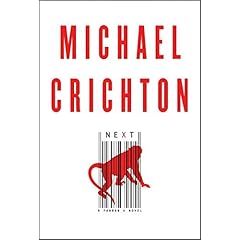
 Crichton’s a smart guy and the premise to his books are really good. I just think he’s become too shallow in his character development. I think his older stuff is better and really love his memoir,
Crichton’s a smart guy and the premise to his books are really good. I just think he’s become too shallow in his character development. I think his older stuff is better and really love his memoir, 